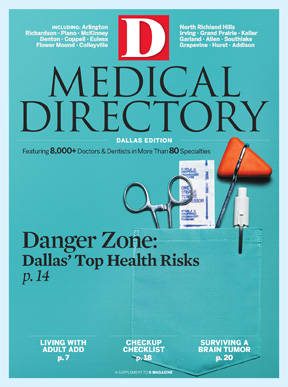Her Checklist
Mental Checkup: At your yearly physical, tell your doctor if you’re having a baby, ending a relationship, getting married, or changing jobs. “These are the times of your life when depression or anxiety can kick in,” says Dr. Riva Rahl, medical director for the Cooper Wellness Program. Be sure to mention changes in mood and sleep to your doctor.
Thyroid Test: During an annual physical, get a Thyroid Stimulating Hormone exam. Thyroid may be at a higher risk of abnormal function during pregnancy and around menopause. Underactive thyroid symptoms are weight gain, sluggishness, excessive sleeping, high cholesterol, depression, chills, hair loss, and brittle nails. Symptoms of an overactive thyroid are insomnia, tremors, palpitations, being hot all the time, increased appetite, and bone loss.
Mammogram: A baseline mammogram is recommended at 35, with yearly mammograms after 40. Women of all ages should do a monthly self-exam and report abnormalities to a doctor.
Pap Smear and Pelvic Exam: These tests check for cervical cancer, sexually transmitted infections, and any abnormalities that could lead to cancer. Both are recommended annually.
Arthritis: Some forms are more common in women, and most can be found in a general blood test. Exercise is the first line of treatment for arthritis—it strengthens the muscles, which puts less pressure on joints.
Bone Density Test: Get a baseline during a bone density test to know if you’re at risk for osteoporosis. Women need about 1,000 mg of calcium a day; if that amount is provided through diet, a supplement isn’t necessary. Rahl recommends calcium citrate and vitamin D supplements for calcium absorption.
Exercise: “Exercise is like the magic pill,” Rahl says. It reduces risk for many diseases and cancer. Women—even pregnant and postpartum—should exercise unless there’s a physical reason they can’t. A baseline stress test can help with an exercise prescription (See His Checklist).
Hers & His
Skin Cancer Screening: Look for new moles and changes in existing moles.
Cholesterol Panel: The test measures levels of HDL, or “good” cholesterol; LDL, or “bad” cholesterol; and triglycerides. “You’re supposed to have them all, but you just don’t want them to be elevated,” says Dr. Camron Nelson, vice president and medical director of Cooper Clinic at Craig Ranch. There are typically no symptoms for high cholesterol.
Blood Pressure: Doctors call it “the silent killer” because there are rarely symptoms. High blood pressure can damage your heart, arteries, kidney, brain, and eyes. Ideally your blood pressure should be at or below 120/80.
Colonoscopy: Adults between 40 and 50 need a colon cancer screening. The less invasive, virtual colonoscopy is a CT scan version read by a radiologist. (It’s a good alternative if you’re 40–45.) The traditional optical colonoscopy is recommended for everyone at age 50.
His Checklist
Stress Test: While this test does help determine your risk for heart disease, a stress test also can help doctors provide an exercise prescription. Doctors look for the blood pressure’s response to exercise, which helps determine what type of exercise and the degree of intensity that best suits your health needs.
Spirometry: This test evaluates lung function in order to detect any sort of lung disorders such as COPD and asthma.
MDCT Scan: This scans the chest and upper abdomen to detect cholesterol buildup in the coronary arteries. If you have a high coronary calcification score on the CT scan, that’s an indicator of risk for heart disease. The scan also screens solid organs in the chest and abdomen for abnormalities such as tumors.
Comprehensive Lab Work: Comprehensive lab work tests blood for cholesterol levels, blood count, and thyroid levels. It also includes a chemistry panel that checks for liver or kidney problems and diabetes. Another test would be a urinalysis, as well as a C Reactive Protein test, which checks for inflammation in arteries. Tests will also check vitamin D levels.
PSA Screening Test: The prostate exam is part of the yearly exam and helps detect early prostate cancer. The important thing about the PSA is the series; therefore, you want to look at the changes from year to year. If the results are going up rapidly, you may need further testing.
Vitamin D: According to Dr. Nelson, 60 percent of us have a low vitamin D level, which may impair our immune systems and increase our risk for certain cancers. Low vitamin D levels also can eventually cause some thinning of the bones. Some natural sources of vitamin D are fish and dairy products, as well as some exposure to sunlight. But, Nelson says, “most of us will end up needing a vitamin D supplement.”
NOTE: Adults need yearly physical checkups starting at age 40 (earlier if there are any significant medical problems). Some of the tests included in the checkup are listed here, but this list is not comprehensive. Depending on age, physical condition, or family history, you may need additional screenings. At Cooper, results from most physical tests are back the same day, and doctors review the results with each patient.




